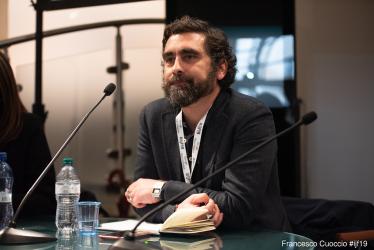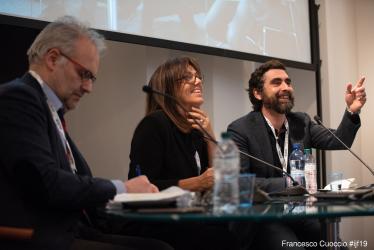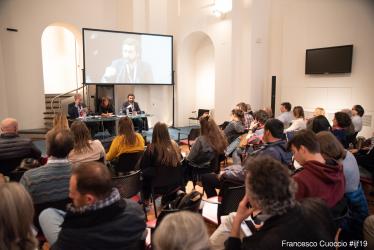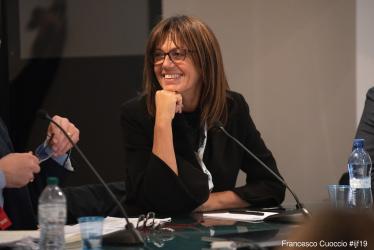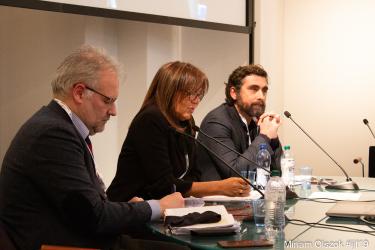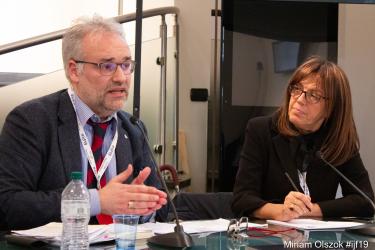Come cambia (anche) il giornalismo nell’era dell’automazione, della iperconnessione e del dominio del tecnologicamente controllato? Quali conoscenze e competenze sono necessarie? Come ri-definire ...
![]()
Prof. Piero Dominici (PhD), Fellow of the World Academy of Art & Science (WAAS), is Director (Scientific Listening) at the Global Listening Center and Scientific Director of the Complexity Education Project; he teaches Public Communication, Sociology and Intelligence Activities at the University of Perugia. As scientific researcher, educator, author and international speaker, his main areas of expertise and interest encompass (hyper)complexity, interdisciplinarity and knowledge sharing in the fields of education, systems theory, technology, innovation, intelligence, security, citizenship and communication. Member of the MIUR Register of Revisers, (Italian Ministry of Higher Education and Research), and of the WCSA (World Complexity Science Academy), he is also standing member of several of the most prestigious national and international scientific committees. Author of numerous essays, scientific articles and books, his published works include (a selection): Per un’etica dei new-media [Ethics for the new media] (1996-1998); La comunicazione nella società ipercomplessa. Istanze per l’agire comunicativo [Communication in the Hypercomplex Society. Solicitations for Communicative Action (2005); La società dell’irresponsabilità [The Society of Irresponsibility] (2010); La comunicazione nella società ipercomplessa. Condividere la conoscenza per governare il mutamento [Communication in the Hypercomplex Society. Sharing Knowledge to Cope with Change] (2011); Dentro la Società interconnessa. Prospettive etiche per un nuovo ecosistema della comunicazione [Inside the interconnected society. Ethical Prospect for a New Ecosystem of Communication] (2014); Communication and Social Production of Knowledge. A new contract for the Society of Individuals, in «Comunicazioni Sociali», n°1/2015, Vita & Pensiero, Milano 2015; La filosofia come “dispositivo” di risposta alla società asimmetrica e ipercomplessa [Philosophy as a “Device” for Reacting to the Asymmetrical and Hypercomplex Society] in AA.VV., Il diritto alla filosofia. Quale filosofia nel terzo millennio?, Diogene Multimedia, Bologna 2016; [Post-Humanist Utopia and the Search for a New Humanism in the Hypercomplex Society] in «Comunicazioni Sociali», n°3/2016, Vita & Pensiero, Milano 2016; Dominici P., Oltre la libertà …di “essere sudditi”, in F.Varanini (a cura di), Corpi, menti, macchine per pensare, Casa della Cultura, Anno 2, numero 4, Milano 2017; Sicurezza è Complessità sociale in M.C.Federici, A. Romeo (a cura di), Sociologia della sicurezza. Teorie e problemi, Mondadori, Milano 2017, pp.49-65; The Hypercomplex Society and the Development of a New Global Public Sphere: Elements for a Critical Analysis, in, RAZÓN Y PALABRA, Vol. 21, No.2_97, Abril-junio 2017; (2017), Of Security and Liberty, of Control and Cooperation. Terrorism and the New Ecosystem communication. [Italian Sociological Review, 7 (2) [DOI: 10.13136/isr.v7i2.XX]; “Fake News and Post-Truths? The “real” issue is how democracy is faring lately”, in «Sicurezza e scienze sociali», V, 3/2017, FrancoAngeli, Milano 2018, pp.175-188; “Objects as systems. The educational and communicative challenges of the hypertechnological civilization”, in P.L.Capucci, G.Cipolletta (eds), The New and History. Art*Science, Noema, Ravenna 2018 - pp.121-133; “Oltre la linearità. Esplorare le connessioni…tra ordine e caos”, in Programmare il mondo. Sfida e opportunità, OTM, Media Duemila, n. 1 - anno 2018; “For an Inclusive Innovation. Healing the fracture between the human and the technological”, in, European Journal of Future Research, Springer, 2017; “The hypertechnological civilization and the urgency of a systemic approach to complexity. A New Humanism for the Hypercomplex Society” in, AA.VV., Governing Turbolence, Risk and Opportunities in the Complexity Age, Cambridge Scholars Publishing, Cambridge 2017.
False news stories in the medical and scientific field: how they are set off, how they are propagated and what can be done about it. The Internet, and social media in particular, is the perfect bre...




